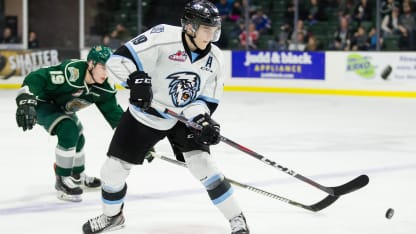The 5-foot-11, 183-pound center for Kootenay of the Western Hockey League will have that confidence and work ethic put to the test this summer while he recovers from surgery June 7 to repair a partial tear to his Achilles tendon.
Krebs, No. 10 in NHL Central Scouting's final ranking of North American skaters, was a projected top-15 selection in the 2019 NHL Draft before sustaining the injury during an on-ice training session June 4. He led Kootenay with 68 points (19 goals, 49 assists), 1.06 points per game and eight power-play goals in 64 games even though Kootenay finished 21st of 22 teams in the WHL.
RELATED: [Full NHL Draft coverage]
He capped his season as Canada's captain at the 2019 IIHF World Under-18 Championship; his six goals in seven games led the team and his 10 points tied for first.
Krebs' agent, Kevin Korol, said he expects to have a recovery timeframe within the next week.
How much the injury will affect Krebs' standing as an early first-round selection is unknown. He already had a lot of teams interested in him, as evidenced by the 23 teams he interviewed with at the NHL Scouting Combine in May.
"It's unfortunate that Peyton had to undergo surgery yet the timing, while adding to the draft intrigue, also allows him the offseason to rehab," director of NHL Central Scouting Dan Marr said. "He is such a well-known, respected and valued prospect that it's unlikely to influence any club's decision-making on draft day. Peyton Krebs is one of those coveted high-character players who always finds a way to contribute and is a leader both on and off the ice."
TSN director of scouting Craig Button, who was general manager of the Calgary Flames from 2000-03, said teams will do their due diligence in learning everything they can about Krebs' injury.
"The first thing teams will do is get information on his injury, ask his agent and advisory group for the medical reports and ask to talk to the surgeon and the doctor," Button said. "Getting those answers from a medical standpoint is the most important thing before you start to make any other determinations.
"I don't have the medical report (on Krebs), but from what I understand and in talking to medical people, this is an injury that will have little to no impact on his future potential and it will heal. It's just a matter of the time he won't be on skates."
Button said even if Krebs' recovery keeps him off the ice until after the start of next season, his talent should keep him a lottery pick.
"It's a setback but a short-term setback," Button said. "If you're satisfied with the medical report that it'll have no long-term implications, then look at him in terms of being a healthy player and just know he's not going to be able to participate in some games in the shorter term. But he's not ready to play in the NHL next October anyway, so I think you're looking at the long-term and not the short-term in this situation."
The first round of the draft at Rogers Arena in Vancouver is June 21 (8 p.m. ET; NBCSN, SN, TVAS). Rounds 2-7 are June 22 (1 p.m. ET; NHLN, SN).



